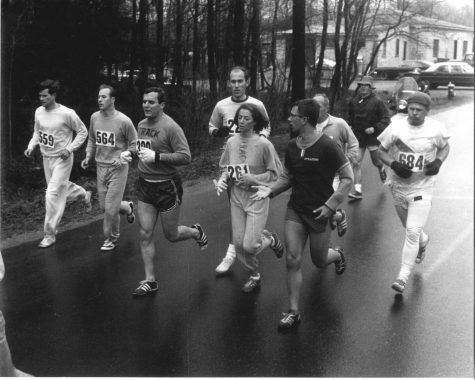Thousands of women ran in the Boston Marathon this year, but back in 1967, 20-year-old Kathrine Switzer was the only woman on the course. Her decision to participate in the marathon that morning sparked a social revolution that has given women across the world the motivation to run for over 50 years.
In 1967, Switzer was a student at Syracuse University studying journalism, who spent her off-hours training alongside the men’s cross-country team. Her coach was impressed as her times got faster and faster so he decided to take Switzer along with the track team to compete in the Boston Marathon.
Switzer registered for the race by filling out the entry form just like everyone else, but instead of writing out her first name, she signed the sheet with her initials “KV.” Her father misspelled Kathrine on her birth certificate and KV has been her nickname since childhood. When she filled out the entry form to register for the race and signed her first name as “KV” instead of “Kathrine,” it was nothing out of the ordinary. No one suspected that KV was a woman and there were no rules specified about gender in the rulebook.
“We probably wouldn’t be having this conversation if I signed the entry form Kathrine,” said Switzer in an interview with The Suffolk Journal.
Switzer was only a mile and a half into the marathon when officials discovered she was a woman, and attacked her in the middle of the street, trying to pry off her bib numbers and screaming at her to get out of the race. Switzer’s boyfriend fended off the angry officials and she went on to complete the marathon, proving that men are not the only ones with the endurance to cross the finish line.
“I said to my coach I was going to finish on my hands and my knees if I had to, cause I knew if I didn’t finish the race no one would believe women could do it,” said Switzer in an interview with The Journal. “That was very very important for me and as it turns out for millions of women.”
From that day forward, Switzer dedicated her life to empowering women from all over the globe to run. She was one of the leaders in getting the Boston Athletic Association to let women run the marathon, and six years later, women were officially allowed to participate in the race in 1972.

In 2015, Switzer founded the nonprofit organization “261 Fearless,” which arranges noncompetitive running clubs that motivate women not only to be active, but to connect and socialize with others. 261 Fearless has running clubs in 11 countries, and by next year, they hope to expand to a total of 15 countries. Currently the organization has about 2,000 members and Switzer seeks to see this number rise.
A team of 35 women represented the organization as one of the 36 official charity teams in the Boston Marathon this year. Clad in matching purple t-shirts, the runners aimed to raise money for the foundation. Switzer was there at the finish line this year, rooting on her team members.
Switzer has been sharing her story for the last 50 years through interviews, memoirs and speeches. But this month, a new way to share her journey as a pioneer athlete and feminist emerged. Kim Chaffee, an elementary school teacher and author, wrote a picture book titled “Her Fearless Run: Kathrine Switzer’s Historic Boston Marathon,” about the acclaimed runner. The book, which was released earlier this month, is letting children explore Switzer’s feat for the first time.
Switzer has written three memoirs, and explained that she always wanted to write a children’s book about her experience, but she never got around to it. After reading Chaffee’s work, she learned that writing picture books is a craft that requires a special kind of talent.
“Children’s writing is difficult, exact, unique, and she has a gift that I don’t have,” said Switzer. “You have to have a special, you have to be a special good writer to be a children’s [writer].”
Switzer explained that when she was growing up, her father encouraged her to run one mile a day and to participate in as much as she could. Now, in addition to Switzer being an inspiration for women, Chaffee’s book is helping spread her message of empowerment to kids.
“If this book really helps young girls and boys to participate, that’s one of my greatest goals because if they can be empowered from an early age, just attaboy, attagirl, you can do anything. Tell them those things,” said Switzer.
Even if Switzer didn’t decide to run the marathon in 1967, she said she believes she still would have run it eventually and still dedicated her life to helping women gain the confidence to run. Although the events that unfolded during her first marathon were unplanned, Boston became the place where this social revolution was sparked.
“There was a bad moment that took place in 1967 that turned into one of the best things of our lives, and that sometimes the worst thing in your life can become the best thing in your life,” said Switzer. “That’s what happened to me with the Boston Marathon.”





















Brian Hume • Apr 17, 2019 at 7:43 pm
I really enjoyed reading the Boston Marathon article on Kathrine Switzer. She is a true pioneer in helping women be able to compete in the Marathon. If it weren’t for Kathrine, you wonder how long would it have been before women were allowed to participate in the Marathon.